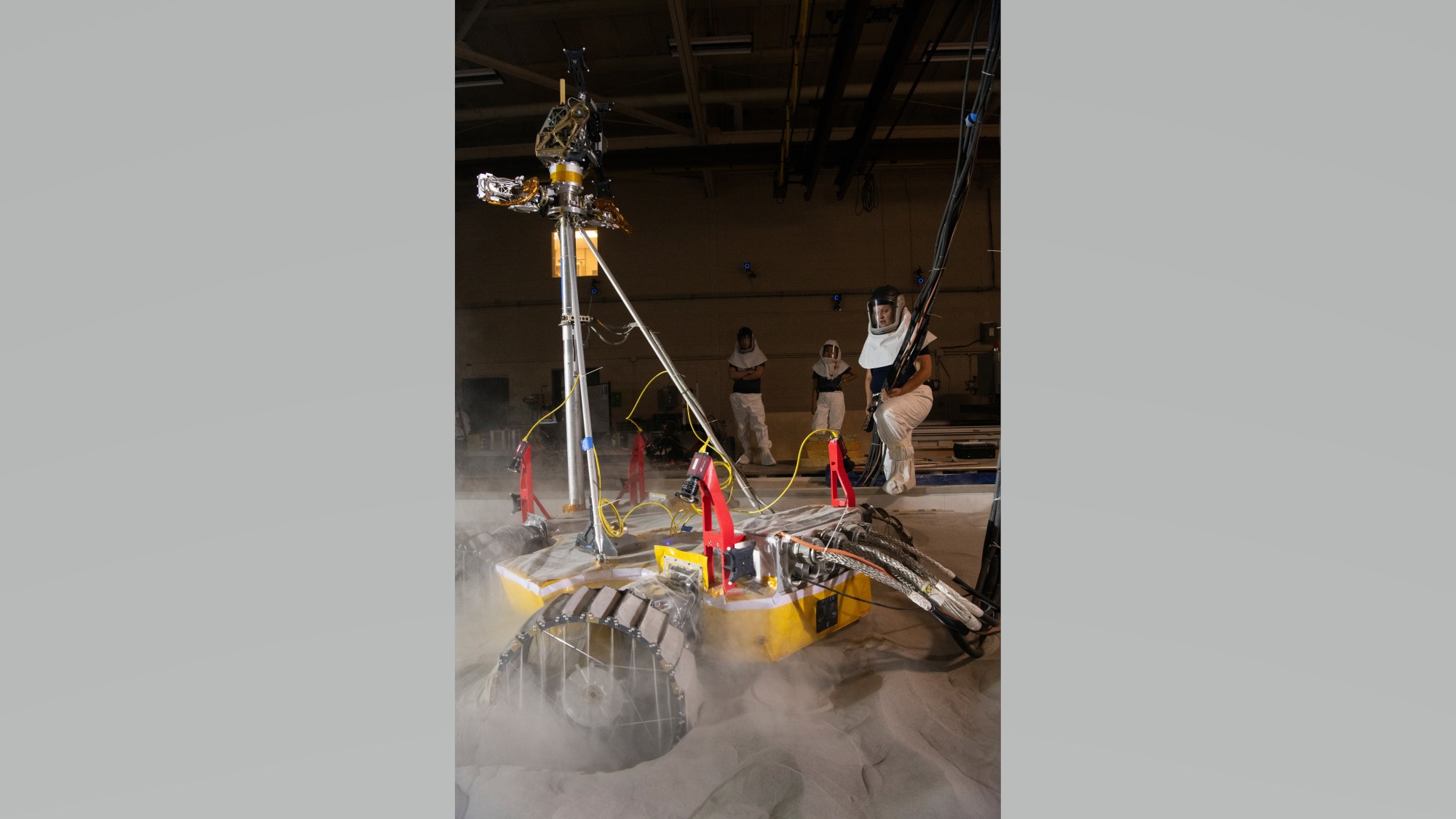Watch a NASA moon rover complete a lunar obstacle course (video)
When it comes to space rovers, it's been all about Mars for NASA — save for the Apollo-era Lunar Roving Vehicle. But that's about to change with the Commercial Lunar Payload Services (CLPS) program. The initiative will see quite a few machines, including rovers, delivered to the moon over the next few years.
One of those robots is NASA's Volatiles Investigating Polar Exploration Rover (VIPER), currently scheduled to land on the moon in late 2024. VIPER will search the moon's south pole for ice and other resources that may aid future human exploration. In order to prepare the rover for its tasks, engineers are testing prototypes of VIPER's components, most recently, its mobility engineering test unit, or Moon Gravitation Representative Unit 3 (MGRU3). For this test, which was completed at the Simulated Lunar Operations (SLOPE) Laboratory at NASA's Glenn Research Center in Cleveland, a VIPER prototype endured a moon-like obstacle course with a detailed simulation of the terrain found around the south pole, including boulders, inclines and quicksand-like soil.
"We wanted to see if the rover is capable of moving forward in an extreme sinkage environment, and how much slower VIPER might drive or how much additional power the rover would use because of tricky soil conditions," Mercedes Herreras-Martinez VIPER risk manager and mission systems engineering technical interchange lead at NASA's Ames Research Center in California, said in a statement.
Related: Rogue rocket's moon crash site spotted by NASA probe (photos)

For the test, the VIPER team replicated the lunar environment as accurately as possible. The rover, which will be deposited on the surface by Pennsylvania-based Astrobotic, will explore a patch of the moon just west of Nobile Crater.
"Using data and imagery from previous lunar missions, we created various randomized scenes to mimic the surface terrain of the moon, with craters and rocks of different sizes and shapes scattered over the SLOPE tilt bed," Kevin May, rover and mission systems engineering intern at Ames who led the terrain preparation for the test, said in the statement. "By recreating realistic moon-like environments, we can get a much better idea of how VIPER will perform on the surface."

Because the Earth has much stronger gravity than the moon, the team stripped away some of the heavy components of the rover to create a test vehicle with a mass-to-gravity ratio that's proportional to what the real rover will experience on the moon. Then, the prototype tested some of its maneuvers, such as the "inch-worm" maneuver, in which the wheels move in a caterpillar-like motion to get the rover out of a sticky situation.
Get the Space.com Newsletter
Breaking space news, the latest updates on rocket launches, skywatching events and more!
"We've captured a lot of data with these tests about what happens when the rover wheels grind over a rock or slip on loose terrain, and any sensor drifts — when the rover gets slightly off-course," Arno Rogg, test director and rover systems engineer at Ames, said in the same statement.
"These tests allowed us to verify the performance of the rover mobility system and know it will work well on the moon," he noted of the prototype experiments.
Follow Stefanie Waldek on Twitter @StefanieWaldek. Follow us on Twitter @Spacedotcom and on Facebook.
Join our Space Forums to keep talking space on the latest missions, night sky and more! And if you have a news tip, correction or comment, let us know at: community@space.com.

Space.com contributing writer Stefanie Waldek is a self-taught space nerd and aviation geek who is passionate about all things spaceflight and astronomy. With a background in travel and design journalism, as well as a Bachelor of Arts degree from New York University, she specializes in the budding space tourism industry and Earth-based astrotourism. In her free time, you can find her watching rocket launches or looking up at the stars, wondering what is out there. Learn more about her work at www.stefaniewaldek.com.









